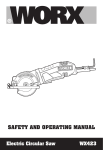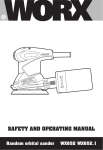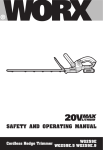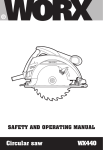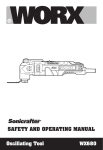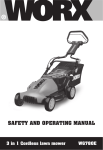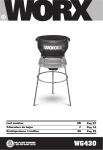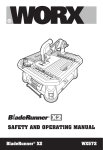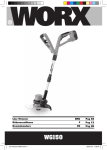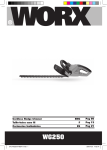Download Worx WX426 Technical data
Transcript
SAFETY AND OPERATING MANUAL Electric Circular Saw WX426 13 1 12 11 2 10 3 4 9 5 8 6 7 15 14 A 1 2 16 C1 B 2 1 C2 D1 D2 E 19 18 17 D2 E F1 F2 19 20 F3 G1 G2 H1 G2 H1 H2 I 1. SOFT GRIP HANDLE 2. FIXED UPPER GUARD 3. VACUUM ADAPTER 4. DUST EXTRACTION OUTLET 5. PARALLEL GUIDE CLAMPING FIXTURE 6. PARALLEL GUIDE 7. LOWER BLADE GUARD 8. BASE PLATE 9. LOWER GUARD LEVER 10. DEPTH ADJUSTMENT LEVER 11.LOCK OFF BUTTON 12.ON/OFF SWITCH 13.HEX KEY 14.SPINDLE LOCK BUTTON 15.LASER 16.SAW BLADE (See Fig. A) 17.BLADE BOLT (See Fig. A) 18.OUTER FLANGE (See Fig. A) 7 19.LASER ON-OFF SWITCH (See Fig. E) 20.LASER BATTERIES (TWO) (See Fig. F2) Not all the accessories illustrated or described are included in standard delivery. Electric Circular Saw WX426 TECHNICAL DATA Type WX426 (4 - designation of machinery, representative of Saw) Voltage 230-240V~50Hz Rated power 400W No load (rated) speed Blade size 3600/min TCT blade 85mmx15mmx1.2mmx24T HSS blade 85mmx15mmx1.2mmx44T Diamond disc 85mmx15mmx1.2mmx60G Max cutting depth 27mm Wood Aluminum Recommended maximum material thickness PVC pipe (diameter) Tile Sheet steel Protection class Bare tool weight 27mm 3mm 13mm 8mm 0.91mm /ll 1.8kg 8 ACCESSORIES TCT 24T Blade 1 HSS 44T Blade 1 Diamond Disc 1 Parallel Guide 1 Vacuum Adaptor 1 Hex Key 1 We recommend that you purchase your accessories from the same store that sold you the tool. Use good quality accessories marked with a well-known brand name. Choose the type according to the work you intend to undertake. Refer to the accessory packaging for further details. Store personnel can assist you and offer advice. Electric Circular Saw WX426 GENERAL POWER TOOL SAFETY WARNINGS WARNING! Read all safety warnings and all instructions. Failure to follow the warnings and instructions may result in electric shock, fire and/or serious injury. Save all warnings and instructions for future reference. The term “power tool” in the warnings refers to your mains-operated (corded) power tool or battery-operated (cordless) power tool. 1WORK AREA SAFETY a)Keep work area clean and well lit. Cluttered or dark areas invite accidents. b)Do not operate power tools in explosive atmospheres, such as in the presence of flammable liquids, gases or dust. Power tools create sparks which may ignite the dust or fumes. c)Keep children and bystanders away while operating a power tool. Distractions can cause you to lose control. 2ELECTRICAL SAFETY a)Power tool plugs must match the outlet. Never modify the plug in any way. Do not use any adapter plugs with earthed (grounded) power tools. Unmodified plugs and matching outlets will reduce risk of electric shock. b)Avoid body contact with earthed or grounded surfaces, such as pipes, radiators, ranges and refrigerators. There is an increased risk of electric shock if your body is earthed or grounded. c)Do not expose power tools to rain or wet conditions. Water entering a power tool will increase the risk of electric shock. d)Do not abuse the cord. Never use the cord for carrying, pulling or unplugging the power tool. Keep cord away from heat, oil, sharp edges or moving parts. Damaged or entangled cords increase the risk of electric shock. e)When operating a power tool outdoors, use an extension cord suitable for outdoor use. Use of a cord suitable for outdoor use reduces the risk of electric shock. f)If operating a power tool in a damp location is unavoidable, use a residual current device (RCD) protected supply. Use of an RCD reduces the risk of electric shock. 3)PERSONAL SAFETY a)Stay alert, watch what you are doing and use common sense when operating a power tool. Do not use a power tool while you are tired or under the influence of drugs, alcohol or medication. A moment of inattention while operating power tools may result in serious personal injury. b)Use personal protective equipment. Always wear eye protection. Protective equipment such as dust mask, nonskid safety shoes, hard hat, or hearing protection used for appropriate conditions will reduce personal injuries. c) Prevent unintentional starting. Ensure the switch is in the off-position before connecting to power source and/or battery pack, picking up or carrying the tool. Carrying power tools with your finger on the switch or energising power tools that have the switch on invites accidents. d) Remove any adjusting key or wrench before turning the power tool on. A wrench or a key left attached to a rotating part of the power tool may result in personal injury. e) Do not overreach. Keep proper footing and balance at all times. This enables better control of the power tool in unexpected situations. f) Dress properly. Do not wear loose clothing or jewellery. Keep your hair, clothing and gloves away from moving parts. Loose clothes, jewellery or long hair can be caught in moving parts. g)If devices are provided for the connection of dust extraction and collection facilities, ensure these are connected and properly used. Use of these devices can reduce dust-related hazards. Electric Circular Saw WX426 9 10 4)POWER TOOL USE AND CARE a)Do not force the power tool. Use the correct power tool for your application. The correct power tool will do the job better and safer at the rate for which it was designed. b) Do not use the power tool if the switch does not turn it on and off. Any power tool that cannot be controlled with the switch is dangerous and must be repaired. c) Disconnect the plug from the power source and/or the battery pack from the power tool before making any adjustments, changing accessories, or storing power tools. Such preventive safety measures reduce the risk of starting the power tool accidentally. d)Store idle power tools out of the reach of children and do not allow persons unfamiliar with the power tool or these instructions to operate the power tool. Power tools are dangerous in the hands of untrained users. e) Maintain power tools. Check for misalignment or binding of moving parts, breakage of parts and any other condition that may affect the power tool’s operation. If damaged, have the power tool repaired before use. Many accidents are caused by poorly maintained power tools. f) Keep cutting tools sharp and clean. Properly maintained cutting tools with sharp cutting edges are less likely to bind and are easier to control. g) Use the power tool, accessories and tool bits etc. in accordance with these instructions, taking into account the working conditions and the work to be performed. Use of the power tool for operations different from those intended could result in a hazardous situation. SAFETY INSTRUCTIONS FOR ALL SAWS CUTTING PROCEDURES a) DANGER: Keep hands away from cutting area and the blade. Keep your second hand on auxiliary handle, or motor housing . If both hands are holding the saw, they cannot be cut by the blade. b)Do not reach underneath the workpiece. The guard cannot protect you from the blade below the workpiece. c) Adjust the cutting depth to the thickness of the workpiece. Less than a full tooth of the blade teeth should be visible below the workpiece. d) Never hold piece being cut in your hands or across your leg. Secure the workpiece to a stable platform. It is important to support the work properly to minimize body exposure, blade binding, or loss of control. e) Hold power tool by insulated gripping surfaces when performing an operation where the cutting tool may contact hidden wiring or its own cord. Contact with a "live" wire will also make exposed metal parts of the power tool "live" and shock the operator. f) When ripping always use a rip fence or straight edge guide. This improves the accuracy of cut and reduces the chance of blade binding. g) Always use blades with correct size and shape (diamond versus round) of arbour holes. Blades that do not match the mounting hardware of the saw will run eccentrically, causing loss of control. h) Never use damaged or incorrect blade washers or bolt. The blade washers and bolt were specially designed for your saw, for optimum performance and safety of operation. 5)SERVICE a)Have your power tool serviced by a qualified repair person using only identical replacement parts. This will ensure that the safety of the power tool is maintained. Electric Circular Saw WX426 FURTHER SAFETY INSTRUCTIONS FOR ALL SAWS KICKBACK CAUSES AND RELATED WARNINGS - Kickback is a sudden reaction to a pinched, bound or misaligned saw blade, causing an uncontrolled saw to lift up and out of the workpiece toward the operator. - When the blade is pinched or bound tightly by the kerf closing down, the blade stalls and the motor reaction drives the unit rapidly back toward the operator. - If the blade becomes twisted or misaligned in the cut, the teeth at the back edge of the blade can dig into the top surface of the wood causing the blade to climb out of the kerf and jump back toward the operator. Kickback is the result of saw misuse and/or incorrect operating procedures or conditions and can be avoided by taking proper precautions as given below. a) Maintain a firm grip on the saw and position your arm to resist kickback forces. Position your body to either side of the blade, but not in line with the blade. Kickback could cause the saw to jump backwards, but kickback forces can be controlled by the operator, if proper precautions are taken. b) When blade is binding, or when interrupting a cut for any reason, release the trigger and hold the saw motionless in the material until the blade comes to a complete stop. Never attempt to remove the saw from the work or pull the saw backward while the blade is in motion or kickback may occur. Investigate and take corrective actions to eliminate the cause of blade binding. c) When restarting a saw in the workpiece, center the saw blade in the kerf and check that saw teeth are not engaged into the material. If saw blade is binding, it may walk up or kickback from the workpiece as the saw is restarted. d) Support large panels to minimize the risk of blade pinching and kickback. Large panels tend to sag under their own weight. Supports must be placed under the panel on both sides, near the line of cut and near the edge of the panel. e) Do not use dull or damaged blades. Unsharpened or improperly set blades produce narrow kerf causing excessive friction, blade binding and kickback. f) Blade depth and bevel adjusting locking levers must be tight and secure before making cut. If blade adjustment shifts while cutting, it may cause binding and kickback. g) Use extra caution when making a “plunge cut” into existing walls or other blind areas. The protruding blade may cut objects that can cause kickback. SAFETY INSTRUCTIONS FOR PLUNGE TYPE SAW GUARD FUNCTION a) Check guard for proper closing before each use. Do not operate the saw if guard does not move freely and enclose the blade instantly. Never clamp or tie the guard with the blade exposed. If saw is accidentally dropped, guard may be bent. Check to make sure that guard moves freely and does not touch the blade or any other part, in all angles and depths of cut. b) Check the operation and condition of the guard return spring. If the guard and the spring are not operating properly, they must be serviced before use. Guard may operate sluggishly due to damaged parts, gummy deposits, or a build-up of debris. c) Assure that the base plate of the saw will not shift while performing the “plunge cut” when the blade bevel setting is not at 90°. Blade shifting sideways will cause binding and likely kick back. d) Always observe that the guard is covering the blade before placing saw down on bench or floor. An unprotected, coasting blade will cause the saw to walk backwards, cutting whatever is in its path. Be aware of the time it takes for the blade to stop after switch is released. Electric Circular Saw WX426 11 ADDITIONAL SAFETY RULES FOR YOUR CIRCULAR SAW 1. Only use saw blades recommended in the specification. 2. Do not use any abrasive wheels. ADDITIONAL SAFETY WARNING FOR CLASS 2 LASER The laser device fitted to this tool is CLASS 2 with a maximum radiation of 1.5mW and 650nm wavelength. CLASS 2 LASER RADIATION, DO NOT STARE INTO BEAM GENERAL SAFETY WARNINGS FOR YOUR LASER 12 WARNING: Read all safety warnings and all instructions. Failure to follow the warnings and instructions may result in serious injury. Save all warnings and instructions for future reference. These lasers do not normally present an optical hazard although staring at the beam may cause flash blindness. Do not stare directly at the laser beam. A hazard may exist if you deliberately stare into the beam, please observe all safety rules as follows: 1) The laser shall be used and maintained in accordance with the manufacturer’s instructions. 2) Never aim the beam at any person or an object other than the work piece. 3)The laser beam shall not be deliberately aimed at another person and shall be prevented from being directed towards the eye of a person for longer than 0.25 seconds area. 4) Always ensure the laser beam is aimed at a sturdy work piece without reflective surfaces, e.g. wood or rough-coated surfaces are acceptable. Bright shiny reflective sheet steel or similar is not suitable for laser applications as the reflective surface may direct the laser beam back at the operator. 5)Do not change the laser device with a different type. The manufacturer or an authorized agent must carry out repairs. 6)CAUTION: Use of controls or adjustments other than those specified herein may result in hazardous radiation exposure. Electric Circular Saw WX426 SYMBOLS To reduce the risk of injury, user must read instruction manual Wood Double insulation Aluminium Warning Metal Wear ear protection Plastic Wear eye protection Tile Wear dust mask Incorrect Do not stare into beam Correct Laser radiation Lock RCM marking Unlock Before any work on the machine itself, pull the mains plug from the socket outlet. Wear protective gloves 13 Diamond disc HSS blade TCT blade ABN: Australian Business Number, according to which business details such as business name and address can be found at website http://abr.business.gov.au Electric Circular Saw WX426 OPERATING INSTRUCTIONS NOTE: Before using the tool, read the instruction book carefully. Recommendation that the tool always be supplied via a residual current device with a rated residual current of 30 mA or less INTENDED USE: The tool is intended for ripping and crosscutting wood and other materials in straight cutting lines, while resting firmly on the work piece. ASSEMBLY AND OPERATION Action 14 Figure Saw blade Assembly and Removing See Fig. A Safety On/Off Switch See Fig. B Rip and Cross Cutting See Fig. C1, C2 Cutting Depth Adjusting See Fig. D1, D2 Using the laser light feature See Fig. E Replacing laser batteries See Fig. F1-F3 Parallel Guide See Fig. G1 G2 Pocket Cutting See Fig. H1 H2 Sawdust Removal See Fig. I approx. 40 teeth for finer cuts, more than 40 teeth for very fine cuts into delicate surfaces, diamond for tile, cement board, etc. Only use saw blades recommended. MAINTAIN TOOLS WITH CARE Remove the plug from the socket before carrying out any adjustment, servicing or maintenance. Keep tools sharp and clean for better and safer performance. Follow instructions for lubricating and changing accessories. Inspect tool cords periodically and if damaged, have repaired by authorized service facility. Your power tool requires no additional lubrication or maintenance. There are no user serviceable parts in your power tool. Never use water or chemical cleaners to clean your power tool. Wipe clean with a dry cloth. Always store your power tool in a dry place. Keep the motor ventilation slots clean. Keep all working controls free of dust. If the supply cord is damaged, it must be replaced by the manufacturer, its service agent or similarly qualified persons in order to avoid a hazard. Periodically clear dust and chips from guard and base to ensure proper performance. WORKING HINTS FOR YOUR TOOL If your power tool becomes too hot, please run your circular saw no load for 2-3 minutes to cool the motor. Avoid prolonged usage at very low speeds. Protect saw blades against impact and shock. Cutting with extreme force can significantly reduces the performance capability of the tool and reduces the service life of the saw blade. Sawing performance and cutting quality depend essentially on the condition and the tooth count of the saw blade. Therefore, use only sharp saw blades that are suited for the material being cut. Choice of blades: 24 teeth for general work, Electric Circular Saw WX426 TROUBLE SHOOTING Symptom Possible Causes Possible Solution Tool will not start when operating the on/off switch. Power cord not plugged in. Power cord is broken. Carbon brush has worn down Check to make sure power cord is connected well into a working outlet. Unplug the power cord. Replace it using a qualified maintenance person. Replace the carbon brush using a qualified maintenance person. Cutting depth is less than that is set. Sawdust accumulated at the rear of the base. Shake out sawdust. Consider connecting a vacuum for dust collection. Blade spins or slips Blade is not tightly engaged with the spindle. Remove the blade, and reassemble it as described in INSTALL/ CHANGE THE BLADE section. Blade will not cut a straight line. Blade is dull. Blade is not mounted properly. Saw is not being guided properly. Mount a new, sharp blade on the saw. Check that blade is properly mounted. Use a parallel guide. Blade kicks back when beginning a cut Blade is not spinning fast enough Allow the saw blade to reach full speed prior to beginning a cut in the material. Electric Circular Saw WX426 15 www.worx.com Copyright © 2014, Positec. All Rights Reserved. 2PSC19APK11002A1
















